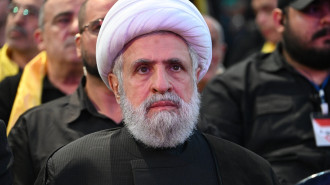Jailing the bloggers who fuelled the Tunisian revolution
Jailing the bloggers who fuelled the Tunisian revolution
Many online writers and activists who supported the revolution are languishing behind bars, but there are others willing to continue the fight.
3 min read
Protesters continue to call for the release of Tunisian blogger Yassin Ayari [Anadolu]
After Mohammed Bouazizi set fire to himself on 17 December 2010, many Tunisians were too afraid to go online to find out what was happening in their own country. Not so were the country's bloggers and activists, who bravely broadcast information to the world about the torture and violence opposition figures and revolutionaries were facing on the street.
None of the violence stopped the "blogger explosion". Coverage of events continued on blogs when most, if not all, of Tunisia's media outlets were praising then-President Zine El Abidine Ben Ali.
Four years after the Tunisian revolution successfully ousted Ben Ali on 14 January 2011, where are the electronic media heroes of the revolution?
Wissem Tlili, owner of the Tunisian blog Normalland's governor - active during this era of repression - spoke to Al-Araby al-Jadeed a few days ago in Tunis. Having just finished producing a short film, he said he was disappointed with the outcome of the Tunisian revolution. It was a regret that showed in his eyes; his words tinged with melancholy.
The revolution failed to achieve even a small part of either his or his companions' dreams. Iconic words of the Tunisian revolution such as work, liberty, and national dignity have become empty slogans today, he said.
We went on to meet Lina Ben Mhenni [Ar], who brought the cause of the revolution to international media forums with her blog A Tunisian Girl. The university professor, locally and internationally renowned for her activism, is also frustrated by the outcome of the revolution.
Mhenni is saddened by the recent imprisonment of her friend, Tunisian film director Ines Ben Othman. Othman was arrested on 19 December 2014 after she launched a complaint against a police officer. Mhenni sees her arrest as a sign the country is regressing on advancements made in the name of freedom and liberty. Every day she has led campaigns calling for the film director's release.
Mhenni's pain is twofold. Her friend Sofiene Chourabi, another blogger who covered the Tunisian revolution has been missing in Libya, along with his colleague photographer Nadhir Ktari, for almost four months. Their fate remains unknown despite unconfirmed reports by the Islamic State group (IS, formerly Isis) they have both been executed. Mhenni says the streets of Tunis miss Chourabi - who used to walk them with his camera, documenting every moment.
The city also misses blogger and electronic-media activist Yassine Ayari, who strived to use social media to bring the Tunisian revolution into the spotlight. Ayari is now in a Tunisian prison accused of "defaming the army" because of opinions he posted on Facebook.
These young people - who fuelled the revolution and brought its voice to the world - are missed on the streets of Tunisia, but their resolve is not lost.
Ben Mhenni, Tlili, Ayari and others such as Fatma Riahi - known online as "Arabicca" - Hana El Trabulsi, Slim Amamou, and other bloggers who flourished during the hard days of the Tunisian revolution are determined to continue the struggle.
It is a long path, they say, but it will be worth the hardship.
This article is an edited translation from our Arabic edition.
None of the violence stopped the "blogger explosion". Coverage of events continued on blogs when most, if not all, of Tunisia's media outlets were praising then-President Zine El Abidine Ben Ali.
Four years after the Tunisian revolution successfully ousted Ben Ali on 14 January 2011, where are the electronic media heroes of the revolution?
Wissem Tlili, owner of the Tunisian blog Normalland's governor - active during this era of repression - spoke to Al-Araby al-Jadeed a few days ago in Tunis. Having just finished producing a short film, he said he was disappointed with the outcome of the Tunisian revolution. It was a regret that showed in his eyes; his words tinged with melancholy.
The revolution failed to achieve even a small part of either his or his companions' dreams. Iconic words of the Tunisian revolution such as work, liberty, and national dignity have become empty slogans today, he said.
We went on to meet Lina Ben Mhenni [Ar], who brought the cause of the revolution to international media forums with her blog A Tunisian Girl. The university professor, locally and internationally renowned for her activism, is also frustrated by the outcome of the revolution.
Mhenni is saddened by the recent imprisonment of her friend, Tunisian film director Ines Ben Othman. Othman was arrested on 19 December 2014 after she launched a complaint against a police officer. Mhenni sees her arrest as a sign the country is regressing on advancements made in the name of freedom and liberty. Every day she has led campaigns calling for the film director's release.
Mhenni's pain is twofold. Her friend Sofiene Chourabi, another blogger who covered the Tunisian revolution has been missing in Libya, along with his colleague photographer Nadhir Ktari, for almost four months. Their fate remains unknown despite unconfirmed reports by the Islamic State group (IS, formerly Isis) they have both been executed. Mhenni says the streets of Tunis miss Chourabi - who used to walk them with his camera, documenting every moment.
The city also misses blogger and electronic-media activist Yassine Ayari, who strived to use social media to bring the Tunisian revolution into the spotlight. Ayari is now in a Tunisian prison accused of "defaming the army" because of opinions he posted on Facebook.
These young people - who fuelled the revolution and brought its voice to the world - are missed on the streets of Tunisia, but their resolve is not lost.
Ben Mhenni, Tlili, Ayari and others such as Fatma Riahi - known online as "Arabicca" - Hana El Trabulsi, Slim Amamou, and other bloggers who flourished during the hard days of the Tunisian revolution are determined to continue the struggle.
It is a long path, they say, but it will be worth the hardship.
This article is an edited translation from our Arabic edition.





 Follow the Middle East's top stories in English at The New Arab on Google News
Follow the Middle East's top stories in English at The New Arab on Google News


